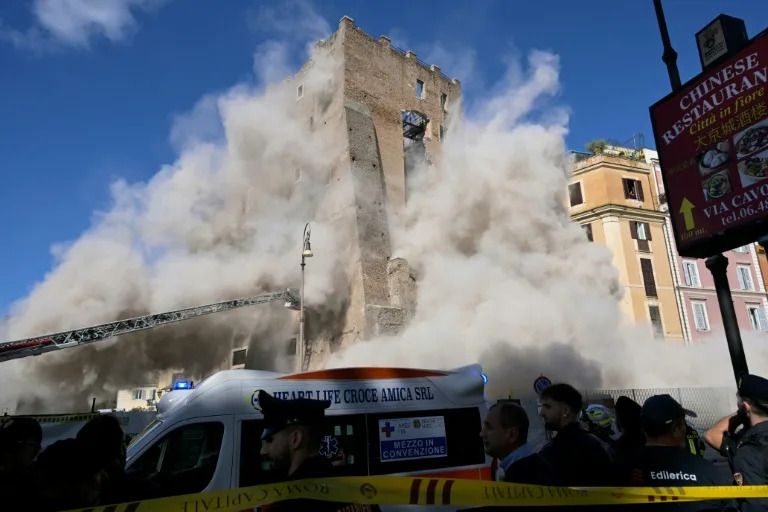The partial collapse of the Torre dei Conti in Rome has drawn international attention following the death of a worker during renovation work funded by the European Union. On March 18, 2025, 66-year-old Romanian national Octav Stroici succumbed to injuries sustained when he was trapped under the rubble for hours. The incident is part of a broader pattern of workplace tragedies in Italy, where safety concerns have become increasingly urgent.
During a somber torchlight procession organized by the CGIL union in Rome, union leader Natale Di Cola expressed deep sorrow, stating, “Today is a day of pain and anger.” The ongoing investigation into the collapse is focusing on safety protocols at the busy construction site near the Colosseum, with some workers alleging that conditions were perilous. One colleague described the site as “not safe” to the Agence France-Presse (AFP).
According to Italy’s National Institute for Insurance Against Accidents at Work (Inail), approximately 575 individuals have lost their lives in workplace accidents across the country in 2025. The construction and manufacturing sectors have been particularly affected, contributing to a troubling trend that regularly garners media attention. The rate of workplace fatalities is marginally above the EU average, but the emotional toll on families and communities remains profound. Pierpaolo Bombardieri, general secretary of the UIL union, called the number of deaths “unacceptable,” highlighting the urgency for reform.
On the same day as the tower collapse, four additional workplace fatalities were reported. These included a 31-year-old who fell while working in a quarry in the Brescia region and a 63-year-old construction worker who died nearly two months after an accident near Naples, according to CGIL.
Government Initiatives and Ongoing Challenges
In response to these ongoing tragedies, Italian Prime Minister Giorgia Meloni‘s government introduced a new workplace safety law last week. After extensive discussions with trade unions, the new decree aims to enhance safety measures on construction sites, including the implementation of a nationwide electronic badge system for companies, including subcontractors. The law also increases inspections and offers financial incentives for firms that successfully reduce workplace accidents.
While the UIL union has given the new measures a “positive assessment,” it cautioned that “there is still much to be done.” Francesca Re David, confederal secretary of CGIL, criticized the initiatives as “extremely limited,” asserting that they fail to adequately address pressing safety concerns.
The issue of subcontracting remains a significant barrier to improving workplace safety in Italy. Fabrizio Potetti, regional secretary of CGIL in Lazio, pointed out that large companies typically have low accident rates, but smaller subcontractors often neglect safety measures to cut costs. He stated, “If we look at large companies, their accident rate is close to zero, but in the chain of contracts and subcontracts, especially among small and medium-sized firms, that’s where accidents happen.”
The UIL union echoed these concerns, emphasizing the need for improved training and better regulation of undeclared work. Ivana Veronese, UIL confederal secretary, stated, “We cannot stop. The lives of workers must be respected and protected, to achieve the only tolerable number – zero.”
Personal Stories of Workplace Tragedy
The personal impact of workplace accidents is profound. Antonino Ferrara, a 29-year-old who suffered a serious injury in an aluminum melting press in northern Italy in 2022, recounted his experience. He described the moment his right arm became trapped, saying, “My world collapsed at that moment.” Ferrara highlighted his lack of proper training and safety equipment at the time of the incident, reflecting a broader systemic issue within the industry.
The tragic collapse of the Torre dei Conti serves as a stark reminder of the urgent need for comprehensive reforms in workplace safety across Italy. As the investigations continue, the call for decisive action resonates more than ever, with unions and workers advocating for a safer work environment, free from preventable tragedies.







